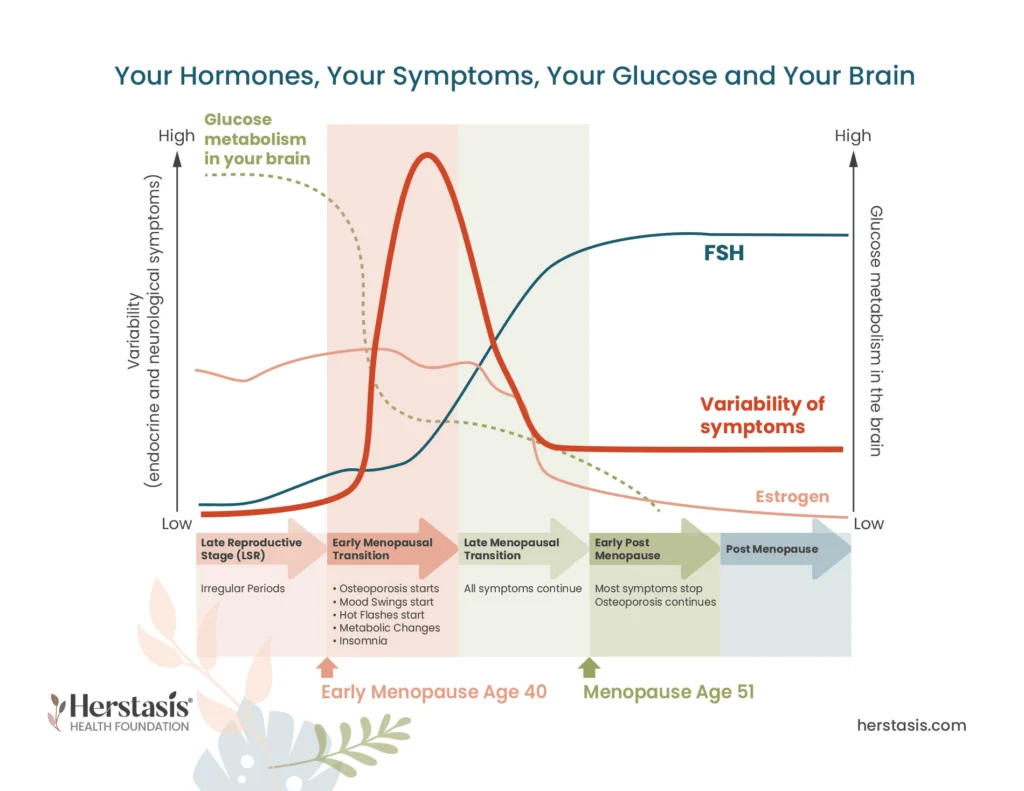
Introduction to Menopause
What Is Menopause?
Menopause is a natural biological transition marking the end of a woman’s reproductive years, typically occurring between ages 45 and 55. This phase is characterized by a gradual decline in the production of estrogen and progesterone hormones. The onset of menopause is individual and often signaled by perimenopause—a period that can span several years and is accompanied by various menstrual changes. In Switzerland, the average age of natural menopause is approximately 51 years but pre-menopause symptoms (perimenopause) can start from the age of 42 .
Did You Know? Zurich offers a wealth of health institutions and counseling services dedicated to providing targeted information and support for women experiencing menopause, fostering a strong local network and facilitating community engagement.
Menstrual Changes and Their Significance
During menopause, fluctuations in the menstrual cycle are common. Typical changes include:
- Irregular bleeding (shorter or longer cycles)
- Heavier or lighter periods
- Increased spotting between periods
- Complete cessation of menstruation
These alterations are a natural part of hormonal adjustments, particularly evident during perimenopause. Accompanying symptoms often include hot flashes and sleep disturbances. Many women in Zurich find that participating in local support groups or counseling centers helps alleviate uncertainties surrounding these changes.
For further guidance and tips on managing these transitions, refer to the section: Perimenopause Management.
Symptoms of Perimenopause and Menopause
Common Menopause Symptoms
Typical symptoms associated with menopause include:
- Hot flashes and night sweats
- Irregular menstrual cycles
- Sleep disturbances (difficulty falling or staying asleep)
- Mood swings
- Weight gain or metabolic changes
- Dryness of the skin and mucous membranes
- Changes in hair and nails
These symptoms are closely linked to hormonal fluctuations. Research indicates that the decline in estrogen and progesterone levels plays a significant role in the manifestation of these symptoms .
Note: Zurich is home to specialized gynecological centers and endocrinologists who offer comprehensive diagnostics and personalized treatment options.
Individual Variations: The Diverse Experiences of Menopause
Each woman’s experience with menopause is unique. Factors influencing the course and intensity of symptoms include:
- Genetic predisposition
- Overall health
- Individual lifestyle (e.g., diet, exercise, stress) and past lifestyle (what was done during the teenage years and in the 20s matter a lot)
- Coexisting medical conditions

In the Zurich area, various regional services—from structured nutritional counseling to stress-reduction courses—are available to help address symptoms on an individual basis.
Recommendation: Engage with others facing similar experiences in your community or online to better understand and contextualize your own journey.
Diagnosis and Testing
When Should You Consult a Doctor?
It’s advisable to seek medical attention if:
- Symptoms such as hot flashes, sleep disturbances, or heart palpitations significantly impact your quality of life
- Unusual bleeding or significant weight fluctuations occur
- There’s uncertainty regarding your health status
In Zurich, regular health check-ups are recommended starting at age 40. Comprehensive medical consultations form the foundation for any subsequent measures, especially when considering hormonal treatments like hormone patches during menopause.
How Is the Diagnosis Made?
Diagnosing menopause involves:
- Detailed medical history and symptom evaluation
- Physical examination
- Specific blood tests to determine hormone levels, particularly:
- FSH (Follicle-Stimulating Hormone): Elevated levels indicate the onset of menopause
- Estrogen and progesterone levels
- FSH (Follicle-Stimulating Hormone): Elevated levels indicate the onset of menopause
In some cases, thyroid function tests or additional parameters are assessed to exclude other causes.
| Test | Significance |
| FSH | Elevated levels suggest the onset of menopause |
| Estradiol | Decreased levels indicate hormonal changes |
| Thyroid | Helps rule out other conditions (e.g., hyper-/hypothyroidism) |

Treatment Options
Hormonal Therapies: Careful Consideration and Supervision
Hormone therapy (e.g., hormone patches for menopause) can alleviate severe symptoms. It’s tailored to individual needs and should always be administered under medical supervision to weigh potential risks (e.g., cardiovascular concerns).
Possible Forms of Hormone Therapy:
- Tablets (systemic effect)
- Patches (e.g., hormone patches for menopause)
- Gels and creams
- Vaginal preparations for localized symptoms
| Therapy Form | Advantages | Risks/Considerations |
| Hormone Patches | Consistent hormone delivery, easy to use | Skin irritation, potentially higher cost |
| Tablets | Simple dosing | Gastrointestinal issues, risk of thrombosis |
| Local Preparations | Effective for vaginal dryness | Possible local irritation |
Tip from Zurich: Many women benefit from in-depth consultations to determine the most suitable therapy. Close collaboration with gynecologists and endocrinologists is crucial.
Natural Remedies and Complementary Methods
Many women seek alternative ways to alleviate symptoms. Key options include:
- Phytoestrogens (e.g., soy, flaxseed, red clover): Plant-based compounds that may exert mild estrogen-like effects .
- Herbal Supplements (e.g., black cohosh)
- Relaxation and Mindfulness Practices (e.g., yoga, meditation)
- Acupuncture
Important: The scientific evidence supporting these methods varies. Professional guidance from experts, such as those available in Zurich’s health centers, is recommended. Not all natural products are inherently safe!
General Nutritional Recommendations: Staying Healthy Through Menopause
A targeted, nutrient-rich diet optimally supports the body:
- Calcium-Rich Foods (dairy products, green vegetables) – for bone health
- Vitamin D (fatty fish, sunlight exposure)
- Whole Grains, Fruits & Vegetables – promote metabolism and overall well-being
- Reducing Sugar & Saturated Fats
Practical Tips for Zurich: Local organic markets, nutrition consultants, and cooking classes offer accessible avenues to healthy eating and new recipe ideas tailored to the needs during menopause.
Living with Menopause
Everyday Strategies: Managing Symptoms
An active lifestyle can alleviate many menopausal symptoms:
- Exercise: Regular walking, cycling, swimming, or yoga
- Relaxation Techniques: Progressive muscle relaxation, meditation, focused breathing exercises
- Balanced Diet
- Support Groups or Individual Counseling for sharing experiences
Women in Zurich often benefit from programs in local fitness centers or preventive initiatives specifically designed for women in menopause.
Enhancing Mental Health and Well-Being
Hormonal changes can also affect mood. To maintain emotional balance, consider:
- Mindfulness Training
- Professional Support such as psychological counseling
- Engagement in Regional Women’s Networks
Zurich hosts various initiatives and discussion groups aimed at developing strategies for increased joy and quality of life.
Regional Support Services in the Zurich Area
Zurich offers numerous support options for women experiencing menopause:
- Self-Help Groups in neighborhoods (e.g., meeting points in Oerlikon, Seefeld)
- Free Information Sessions in pharmacies, adult education centers, and health centers
- Specialists in Menopause Therapy in gynecological practices
- Exercise Classes and Relaxation Groups specifically for women over 40
Specific Information: Addresses and schedules can be found on the City of Zurich’s website or in local event calendars.
Consultations at Holistiq Health Group AG
Our Services for Your Menopause Journey
Holistiq Health Group AG in Zurich provides comprehensive, holistic consultations for women during menopause:
- Development of Personalized Health Strategies in menopause counseling
- Recommendations for Nutrition, Exercise & Stress Management
- Scientifically Backed Information on hormonal & natural treatment options
- Personalized Support for all medical, health and emotional concerns
Testimonials: Voices from Our Clients
Many women in Zurich report:
- Significant Improvement in well-being
- Increased Confidence in managing symptoms
- Positive Changes in quality of life & self-perception
Client Testimonial:
“The clear and empathetic counseling truly helped me feel active and confident before my menopause.”
Scheduling Your Appointment
To arrange a personalized consultation at Holistiq Health Group AG, you can book an appointment here: Book my free call:. We recommend early registration to avoid waiting times.
To know more about Holistiq Menopause: visit this page.
Process:
- Initial Contact via the booking platform
- Assessment of your consultation needs during the free call
- Development of a Tailored Plan in collaboration with our experts
Take the first step towards enhanced well-being—we are here to support you in Zurich!
FAQ on Menopause – Your Most Pressing Questions
How do I know if I’m entering menopause?
Typical signs include irregular periods, hot flashes, sleep disturbances, and mood swings. A doctor can provide clarity through hormone testing.
What are the benefits of hormone patches during menopause?
Hormone patches offer consistent hormone delivery, are easy to use, and can effectively alleviate severe symptoms. Benefits and risks should be discussed individually with your doctor.
Are there regional support services in Zurich?
Yes, numerous specialized centers, support groups, and events cater specifically to women in menopause. Information is available through your local municipality or specialized counseling centers like Holistiq Health Group AG.
Can I alleviate menopausal symptoms without hormones?
Many women have positive experiences with herbal supplements (e.g., soy, black cohosh), dietary changes, exercise, and relaxation techniques.
When should I seek medical advice for menopausal symptoms?
If you experience severe, persistent symptoms, unusual issues, or uncertainty about your health status, it’s advisable to consult a specialist promptly.
References & Further Resources
- ACOG – American College of Obstetricians and Gynecologists: Menopause Information
- Deutsche Gesellschaft für Gynäkologie und Geburtshilfe: Leitlinien Menopause
- Schweizerische Menopause Gesellschaft
- Alter der Menopause weltweit – Aerzteblatt
- Stadt Zürich: Gesundheitsangebote
- Holistiq Health Group AG – Menopause-Beratung


